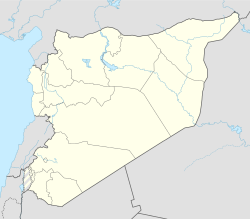Jdeidat Yabous (Arabic: جديدة يابوس; also spelled Jdeidet Yabous), previously known as Ainkania, is a village situated 45 kilometres (28 mi) west of Damascus, Syria.[2][3][4] According to the Syria Central Bureau of Statistics, the village had a population of 994 in the 2004 census.[1]
Jdeidat Yabous
جديدة يابوس Jdeidet Yabous | |
|---|---|
Village | |
| Coordinates: 33°39′14″N 35°58′18″E / 33.65389°N 35.97167°E | |
| Country | |
| Governorate | Rif Dimashq Governorate |
| District | Qudsaya District |
| Nahiyah | Al-Dimas |
| Population (2004 census)[1] | |
• Total | 994 |
| Time zone | UTC+3 (EET) |
| • Summer (DST) | UTC+2 (EEST) |
The village sits in the hills, on the border between Syria and Lebanon where a checkpoint is operated between the two countries. Weapons have been seized at the checkpoint, being smuggled from Lebanon concealed in the floor of a truck, to arm rebels in the Syrian civil war.[5]
Ain Qaniya spring and Roman temple
editThere is a spring and Roman temple in the area called Ain Qaniya or Ayn Qaniya. Julien Aliquot identified the ancient name of the village, which was previously called Ainkania after this spring.[3] A study of the ancient settlement and sanctuary is currently in progress under Ibrahim Omeri.[6] It has been suggested that the goddess Leucothea was worshiped at the temple, which sits in the north east of a group of Temples of Mount Hermon.[7]
References
edit- ^ a b General Census of Population and Housing 2004[permanent dead link]. Syria Central Bureau of Statistics (CBS). Rif Dimashq Governorate. (in Arabic)
- ^ May M. Hourani; Charles M. Heyda; United States Board on Geographic Names; United States Defense Mapping Agency (1983). Gazetteer of Syria: names approved by the United States Board on Geographic Names. Defense Mapping Agency. Retrieved 23 September 2012.
- ^ a b Susanne Carlsson (29 April 2010). Hellenistic democracies: freedom, independence and political procedure in some east Greek city-states. Franz Steiner Verlag. ISBN 978-3-515-09265-4. Retrieved 23 September 2012.
- ^ a b Jan Petránek; Franklyn Bosworth Van Houten; International Geological Correlation Programme. Project 277, Phanerozoic Oolitic Ironstones (1997). Phanerozoic ooidal ironstones: contribution to the International Geological Correlation Programme: Project 277-Phanerozoic Ooidal Ironstones. Czech Geological Survey. ISBN 978-80-7075-245-6. Retrieved 23 September 2012.
{{cite book}}: CS1 maint: numeric names: authors list (link) - ^ "SANA: Syrian authorities seize arms coming from Lebanon, Now Lebanon, 29 September 2011". Archived from the original on 30 January 2013. Retrieved 23 September 2012.
- ^ Ted Kaizer (2008). The Variety of Local Religious Life in the Near East In the Hellenistic and Roman Periods. BRILL. pp. 319–. ISBN 978-90-04-16735-3. Retrieved 23 September 2012.
- ^ Louis Jalabert; René Mouterde (1967). Inscriptions grecques et latines de la Syrie ... P. Geuthner. Retrieved 23 September 2012.
External links
edit- Photo of Jdeidat Yabous bordergate on panoramio.com
- Jdeidat Yabous on geographic.org
- Jdeidat Yabous on mapmonde.org
- Last Syrian checkpoint on wikimapia.org
